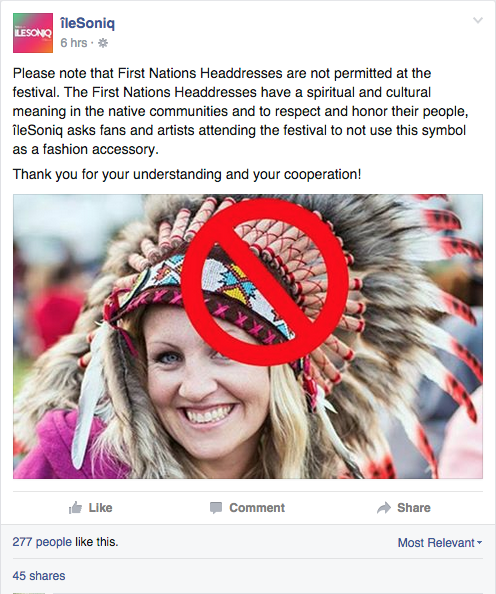By Peter Rubinstein
Heavy Montreal and Osheaga has also decided to disallow headdresses from here on out.
Why music festivals are banning First Nations headdresses
By Sheena Goodyear
"First Nations Headdresses have a spiritual and cultural meaning in the native communities and to respect and honour their people, Osheaga asks fans and artists attending the festival to not use this symbol as a fashion accessory,” reads a post on the festival's Facebook page on Monday.
Believed to have originated with the Sioux Indians and other tribes in the Great Plains regions, the feather headdresses, or war bonnets, are worn only by chiefs and warriors, with each feather indicating an act of bravery or heroism, according to the American Indian Heritage Foundation.
In An Open Letter to Non-Natives in Headdresses, Montreal Métis blogger Chelsea Vowel compares wearing a headdress for fun to sporting a war medal you didn't earn or faking a university degree.
By Roger Kingkade
And, friend… that’s not OK. And if it’s not OK at Coachella, it’s not OK at Calgary Folk Fest.
What is OK, is to go ahead and hear why it’s not OK, so that you can understand the issue a little better.
But please heed this: If you currently think a Native American headdress is kitschy attire, nobody is calling you racist, demanding you explain yourself, or going out of their way to be offended. You’re not on trial here. Just as having a fraudulent PhD is offensive to lots of doctors, and wearing unearned military medals is offensive to lots of veterans, wearing a headdress is offensive to lots of indigenous people.
The Montreal music event’s decision to ‘respect and honour’ First Nations people was praised for taking an uncompromising stance toward the ubiquitous offence
By Calum Marsh
The incident has effected more substantive change elsewhere, as music festivals across Canada continue to speak out against appropriation and impose hardline bans. The Edmonton Folk Festival revealed on Facebook earlier this week that at “this time of greater awareness” it would like its attendees “to respect First Nations cultures and to not wear any type of First Nations headdresses during the festival,” adding that these items would in fact “be confiscated by festival security” should anyone opt to bring one anyway. The Calgary Folk Festival, following Winnipeg’s precedent, has publicly implored its patrons to leave headdresses at home but won’t officially forbid them.
Osheaga, which attracts upwards of 40,000 people to its grounds each day, is the highest-profile music festival to ban headdresses in order to “respect and honour” the First Nations people. The Facebook announcement got more than 12,000 likes in only three days–and provoked serious conversation online and in the media about what can be done about cultural appropriation. The comments lurking under the post, of course, are rife with the expected discontent and hand-wringing about political correctness. But for the most part the reaction from indigenous people and non-indigenous people alike has been thankful, even celebratory.
Caroline Audet, manager of public relations at Evenko, Osheaga’s promoter, feels the response has been “very positive.” “Once people understand the meaning of it and the reasons,” she says, “they are very happy with the decision.” But no specific incident was the catalyst for the change in policy. “The First Nations headdresses have a spiritual and cultural meaning in the Native communities,” Audet explains. “We saw more and more fans wear these at other festivals and we just don’t want this to happen at our festival.” That A Tribe Called Red, a First Nations electronic group from Ottawa, is set to perform this year made it “even more important to make this decision out of respect for them.”


No comments:
Post a Comment
Note: Only a member of this blog may post a comment.